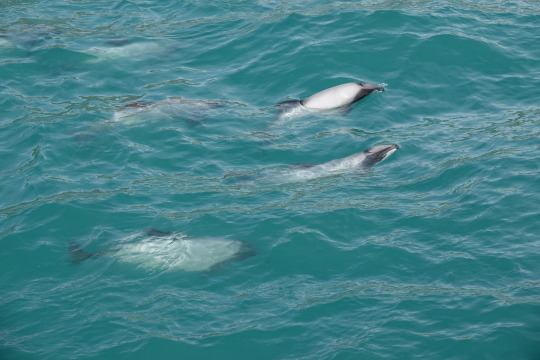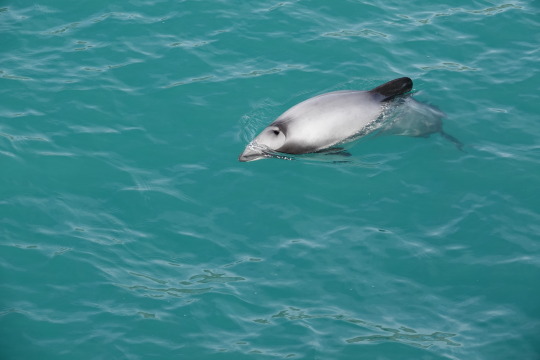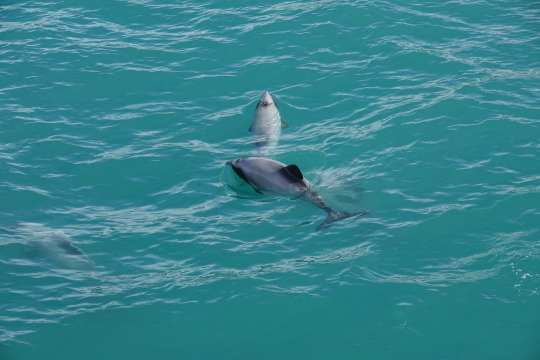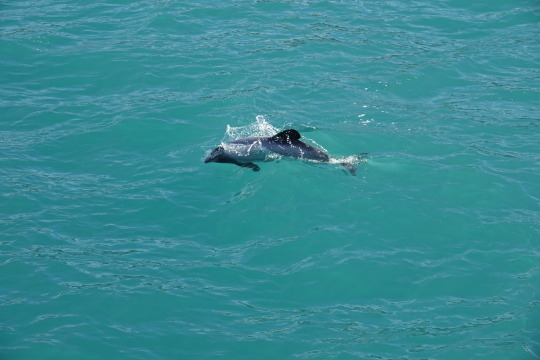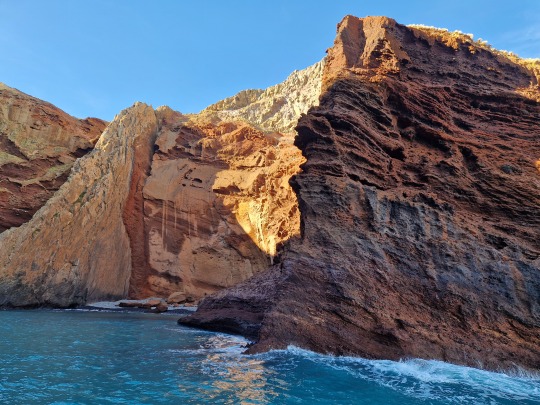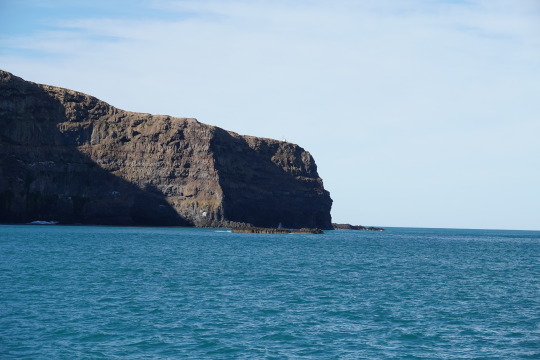#Hector's dolphin
Explore tagged Tumblr posts
Text
this is what i'm doing with my tumblr mutuals
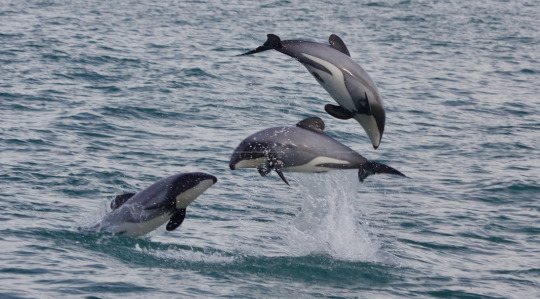
1K notes
·
View notes
Text

A pod of Hector's dolphins (Cephalorhynchus hectori) leap from the water in Aotearoa
by Anjanette Baker
#hector's dolphin#dolphins#cetaceans#cephalorhynchus hectori#cephalorhynchus#delphinidae#cetacea#artiodactyla#mammalia#chordata#wildlife: aotearoa#wildlife: oceania
437 notes
·
View notes
Text
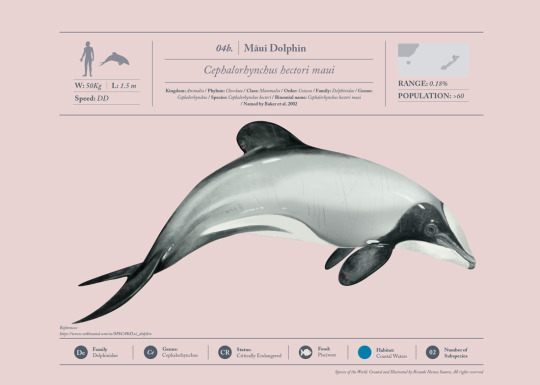
The digital sticker album is almost done. I will begin with Perissodactyla order which contains the rhinos, horses, and tapirs families. Is looking good and the mechanics are working. More of it soon. Let's see the animal of this week. Māui Dolphin This is a subspecies of Hector's Dolphin (The one I showed you the last time). Also, live uniquely on New Zealand coasts, but more specifically in a very small range of the West of the North Island of the country. Sadly, less than 60 animals exist in the wild, making it the most endangered dolphin in the world. There are several programs that are in action in order to protect it from extinction and the results have been somehow optimistic. Fishing, Toxoplasmosis (an infection caused by a parasite called Toxoplasma), Brucellosis (a Bacteria), Oil and gas operations, and Climate change are the reasons why this dolphin is on the brink of extinction. It's always sad to see an animal fading away. I hope the programs that are working to recover their numbers work. Here is a link to one of them in case you want to know more. Maui63 ______________________________________________ Credits: Māui Dolphin _____________________________________________ Thank you guys for your love and support. Don't forget to give it a Like or reblogs if you like the content. You also can follow the page or check out my store if you want to give some support. See you next week.
#Hector's Dolphin#Maui Dolphin#cute dolphin#dolphins#delfin#wild animal#animal of the day#illustration scientifique#illo#scientific illustration#inforgraphics#extinct species#recently extinct#extinct animals#science side of tumblr#science#sea mammals#sea life#cute animals
73 notes
·
View notes
Text

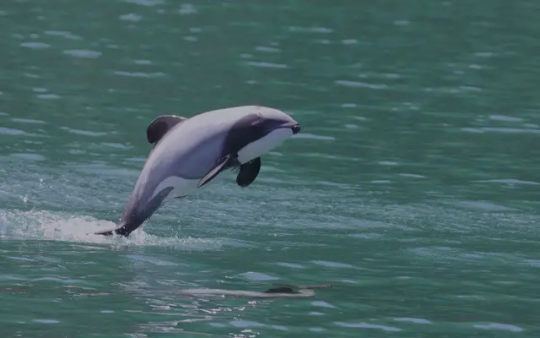
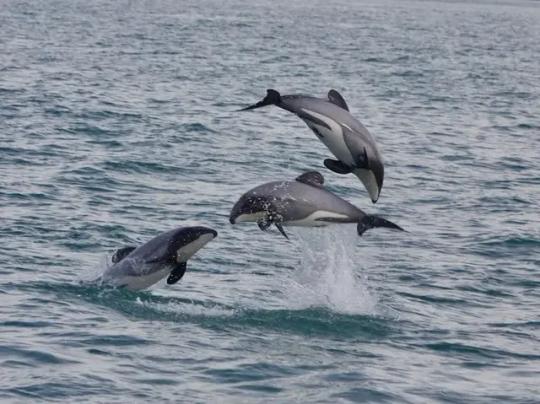
Honestly, these 'lil guys are kinda cute.
Look at their stubby little faces and rounded dorsal fins and that pretty color pattern! Long may they swim undisturbed in the beautiful jade-green waters of Lyttelton Harbour.
7 notes
·
View notes
Text

[ID: An image of a Hector's dolphin from Petz: Dolphinz Encounters. End ID.]
Hector's dolphin from Petz Dolphinz Encounters (2009-)
3 notes
·
View notes
Text
they're so baby <3 that first picture is an omnishambles tho <3
In another edition of cetaceans breaching, I present to you my beloved Hector's/Māui's Dolphin, (Cephalorhyncus hectori). Every photo of these little guys jumping out of the water is equally adorable and chaotic and I love them for that.
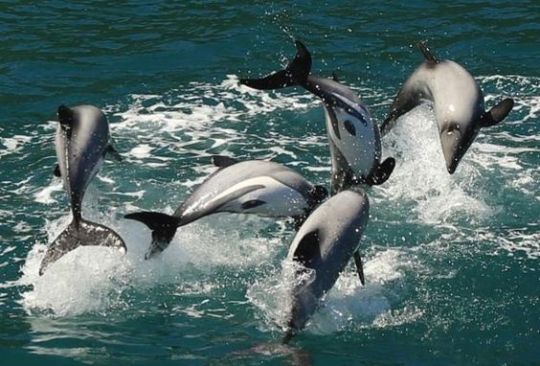
What is even going on here?

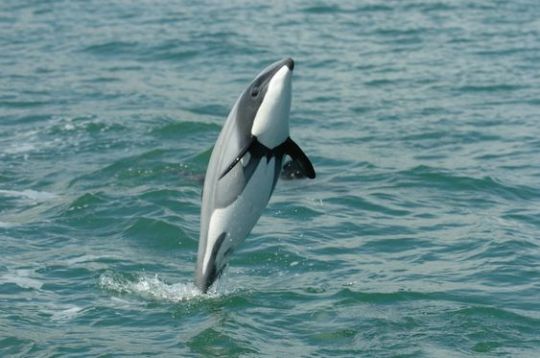
They're leapin'.


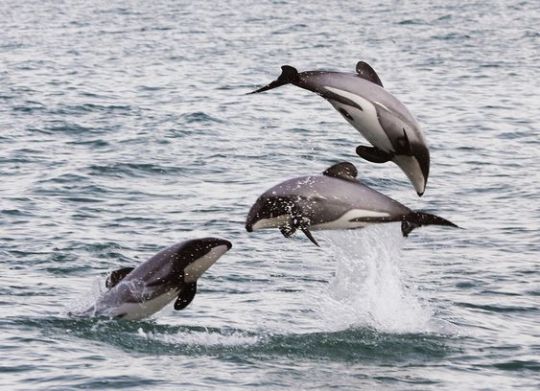
2K notes
·
View notes
Text

hector's dolphin-coloured pencils
0 notes
Text
🐬 Daily Cetacean Fact: 🐬
Hector's Dolphin: Hector's dolphin is the only cetacean endemic to New Zealand. Similar to the Hourglass Dolphin, Hector's dolphins use high-frequency echolocation clicks. However, the Hector's dolphin produces lower source-level clicks than the hourglass due to their crowded environment. This means they can only spot prey at half the distance. The species has a very simple repertoire with few types of clicks, as well as little audible signals in addition to these.
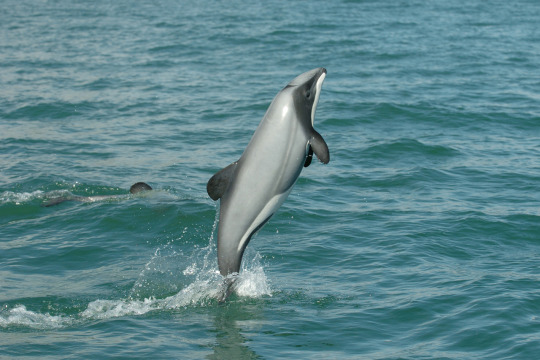

#hectors dolphin#dolphin#cetacean#daily cetacean#daily dolphin#daily cetacean fact#daily dolphin fact#dolphin fact#cetacean fact#facts about cetaceans#facts about dolphins#respect the locals#shark blog#ocean animal#ocean life#ocean#marine animals#marine biology#marine life#marine mammal#marine#new zealand
56 notes
·
View notes
Photo

South Island Hector’s dolphin Cephalorhynchus hectori hectori
Observed by stevereekie1, CC BY-NC
#Cephalorhynchus hectori hectori#South Island Hector's dolphin#Cetacea#Delphinidae#cetacean#dolphin#Oceania#New Zealand#Pacific Ocean
78 notes
·
View notes
Note
well now we gotta come full circle hbjsdfhbj top 3 marine animals >:]
AA YAYYYY MY GUYS !!!!!!!!!!!
ok ummmm ill try my best to not make them all cetaceans
3. oceanic white tip shark they are round!!! and have fish friends!!!! 10/10 best shark everyone except bamboo sharks go home
2. any sturgeon literally any of them. roping arapaimas in there too i love big freshwater fish :]
1. ORCAS RRAAAAA theyre my everything i cannot express. how much i adore them. specifically pack ice large type b's theyve got big ol eye(patch)s
#asks#TYYY AGH I LOVE WHEN ANIMALS ARE IN WATER#gonna list more of my favorites rapid fire i gotta get this out#false killer whales minke whales dusky dolphins hectors dolphins bowhead whales ACK MY PHONE IS DYING#lancet fish pyjama sharks thresher sharks blacktip reef sharks zebrafish sea turtles electric eels sea lamprey#YAYAYAYAY
5 notes
·
View notes
Text
Seems opinions are divided in NZ. How about here on Tumblr?
Here’s Bruce Cotterial’s opinion piece from NZ Herald - March 29, 2024
The comments of Sir Russell Coutts in the aftermath of the cancellation of racing on day one of SailGP in Lyttleton should serve as a warning to our country.
For far too long we have had our otherwise massive potential cut down by minority interest groups. People striving for publicity for the narrow little lens through which they see the world and people intent on protecting their own interests. These people are everywhere in this country.
These people claim to represent the birds, dolphins, trees, marginalised communities and ethnic minorities. They are champions of bureaucracy, compliance, red tape and health and safety. They are against everything that the rest of us, the great majority of us, see as desirable or necessary.
You see, none of the above contribute anything substantive to our economic success on the world stage. That is left to our farmers, tourism industry operators, our entrepreneurs and our sportspeople, the latter group which incidentally includes our yachties.
Sir Russell Coutts’ outburst has been a long time coming. Many of us have been hoping that someone would speak up. Someone with pulling power. An achiever. And now, someone finally has.
In case you missed it, Coutts was lamenting the cancellation of racing on day one of SailGP in Lyttleton. Many Aucklanders will remember lining up on the city’s best vantage point, preparing for America’s Cup racing. And then, the disappointment of a cancellation. In those cases, the weather was to blame. Last weekend, the weather was perfect.
Coutts is passionate about ocean racing. He’s one of the best in the world at it. Through his expertise, passion and undoubted competitiveness, he has done some wonderful things for his home country. He won an Olympic gold medal. He also led his country to win one of the world’s oldest sports trophies, the America’s Cup. Twice. He took that trophy away from us too.
Lyttleton Harbour is a wonderful natural venue for SailGP. You only had to look at the television pictures from the following day to admire the spectacle. However, according to Coutts, the world saw only half of the potential spectacle, because of an overreaction to the presence of one or a few dolphins.
When Coutts left Team New Zealand, a nasty side of the Kiwi psyche was displayed by a few high-profile New Zealanders, including some poorly informed journalists. His crime was that he chose to sail for another team. But we eventually forgave him and he forgave us.
That crime was minor compared to that of the current Team New Zealand hierarchy, who, not content with winning the Cup, have chosen to defend it on foreign soil. Their stated reason? Money! But I digress.
Coutts might be about to take something away from us again. SailGP racing. This time it’s of our doing, not his.
With last Saturday’s racing cancelled and a requested Sunday morning practice session also delayed by the authorities, the usually shy Coutts took his place behind the microphone on Newstalk ZB’s Sunday afternoon sports programme. He was clearly frustrated, emotional, and upset as he spoke.
His quivering voice started with the following: “SailGP operates all over the world, and no doubt there are marine mammals in the water in all of the locations we race. We’ve never had an incident in 35 events. Our people and our athletes care deeply about marine conservation.”
He went on: “In addition to our normal marine mammal protocols, SailGP has had this extreme marine mammal management plan forced upon us in Lyttelton, demanded by the Department of Conservation, Ecan and Ngāti Wheke for this event. Otherwise, SailGP would not be permitted to race. Other harbour users, including commercial users, are not subject to such protocols.”
He continued that SailGP had unrequired services forced on them, services that are not required nor demanded anywhere else in the world. The costs of those unrequired services? Approximately $300,000. And that doesn’t count the “11 so-called expert dolphin observers that are being paid... $600 per day each, plus their expenses in a programme that totals $78,000″.
We might not want to admit it. But the great majority of us will accept that Coutts is right. But it’s not just sailboat racing that’s affected by the issues he has raised.
In the aftermath of Coutts’s comments, someone said that SailGP is a commercial venture that should be subject to greater compliance rigour than that of other activities. But cruise ships are a commercial venture too. Some of them have three propellers, each measuring 6m in diameter. Lyttleton welcomes 70 such ships a year in their harbour alone. By the time they arrive and leave that’s 140 movements of a vehicle big enough to kill multiple dolphins, or anything else for that matter, in one revolutionary cycle of the propeller. How many of those cruise ships get cancelled because of the dolphins? None.
Event managers in this country have been hamstrung for some time. But these issues also impact our property developers, entrepreneurs, our once-thriving film industry, our farmers and our tourism operators too.
It’s not a new problem. But it has been getting worse for a long time.
Some of our politicians have tried to draw attention to it. A few of our highly regarded personalities have also had a crack. But the words of the returning sporting hero, attempting to bring something spectacular to his home country, yet frustrated by inexcusable layers of bureaucracy and red tape, cut deeper than most.
Coutts went on to say how difficult it is to get things done in New Zealand. He’s right. There are people who can’t renovate their houses, houses that they own, for the same reasons that Coutts is complaining about. Our wilful bureaucracy is crushing our ability to get things done and with it, our spirit.
New Zealand is overburdened by minority groups who shout louder than the majority. Those minorities seem to be singularly focused on stopping things from happening. We seem to be better at coming up with reasons why we can’t do things than we are at coming up with reasons why we can.
And so it seems that the minorities, the greenies, the environmentalists, the socialists, the compliance officers, the protesters and the woke university activists are the people who decide what we, the majority, can do. They make the noise and they get the airtime. Even though they are often disproportionately supported by their friends in the broadcast media, their causes would seldom gain support from 10 per cent of the population, if asked.
But they make the noise. They stop things from happening. They call the shots.
Sadly, we have become beholden to these minority groups and to rogue individuals in positions of power. We have democratically elected mayors who can’t do what they want to do or need to do for their cities. In their way are organisations and individuals claiming that they are the victims and seeking to protect the tiny pedestal on which they stand.
Those activists will have seen the cancellation of Saturday’s yacht racing as a victory. You see, it’s not about the dolphins. It was never about the dolphins. It’s about minority interest groups and how much noise they can make. It’s about headlines. It’s about stopping things that the majority of us want.
Those on the opposite sides of these debates seldom stand up to them. The reality is that we’re too busy working at our day jobs, raising our kids, volunteering for the school or the surf club, and perhaps hoping to take the family to a weekend sporting spectacular that otherwise would only be seen on a TV screen.
Our only hope should be that that spectacular event will be allowed to occur.
The irony of last weekend was that Melbourne, that event-laden city just a couple of thousand kilometres to the west of us, hosted some 460,000 people at the Formula One Grand Prix over the very same weekend.
Formula One is dangerous, noisy and smelly. It’s environmentally unfriendly. There are protesters in Melbourne too. But their elected officials understand what value such events bring to their city. And they defend it to the hilt. They make it easy. Event organisers meet with city officials who give them what they need to make things happen.
SailGP gets that too, in most of the cities to which it brings its spectacle. Most cities compete for such attention. They go along with it because it brings millions of dollars and hundreds of millions of television viewers to the host city and country. It’s commerce. It works. We had it handed to us on a plate by one of our most successful sons. But we killed it.
In the meantime, we can’t have Taylor Swift concerts because they make too much noise and there will never be car racing at Pukekohe again. Christchurch took 10 years to agree to replace their stadium and Auckland can’t even make a decision to build one. Traffic management plans prevent us from hosting a major sporting event and Auckland Council can’t give permission for a harbourside grandstand from which to watch a yacht race.
And of course, we might never again entertain the remarkable young men and women and the spectacular flying machines of SailGP.
Perhaps we could host a chess tournament.
Paul Lewis’s Opinion piece from the New Zealand Herald - March 28, 2024
I tried to see the SailGP schemozzle with the Hector’s dolphins from Sir Russell Coutts’ point of view, I really did.
Yes, New Zealand has too much red tape and, yes, SailGP has never been guilty of slicing up a dolphin of any description (that we know of); certainly not a species considered “nationally vulnerable”.
That precise wording means he was technically, semantically right about Hector’s dolphins not being endangered, though he did go a bit OTT saying someone had “lied” about that.
Hector’s dolphins aren’t a single species - their sub-species Māui’s dolphins are critically endangered, estimated to number only 54.
It was Hector’s dolphins guilty of stopping the show at Lyttelton Harbour last weekend - and they are said to number 15,000 by the Department of Conservation.
A whole 15,000, eh? What was anyone worrying about? There’s plenty of the little fellas and we all know how good humans are at ensuring vulnerable species recover and don’t go extinct.
Why, in the last 50 years, only 800 species of mammals, fish, reptiles, birds and amphibians have become extinct, according to the World Wildlife Fund. Plenty left.
And, yes, there is an awkward contradiction in the fact Lyttelton Harbour doesn’t preclude power boats, with their whizzing propellers which could, in theory, produce dolphin sashimi. There are rules, however, they must adhere to. Just as SailGP had to.
I am also certain SailGP has never, as Sir Russell said, had to take such “extremely restrictive” measures on any other course in the world.
That’s because Lyttelton Harbour is a marine mammal sanctuary. How many other sanctuaries has SailGP raced on? I’m betting on zero.
That’s like me starting up a global chainsaw event, inviting chainsaw experts from all over the world to compete in an open field, slicing up logs and what have you.
But, this time, I want to hold one in the grounds of a day care centre in Auckland - because I have never, ever, hurt a pre-school child with a chainsaw in previous events.
And you can’t turn around and savage people after SailGP agreed to marine sanctuary rules which were applied when the very thing they were designed for happened - a dolphin or dolphins on the course.
Sir Russell gave us a grandstand view of a seriously wealthy 62-year-old man expressing his frustration and entitlement at bureaucrats and pesky dolphins compromising the $5.5 million he says he pumps into the local economy. His bitter tirade about the cancelled racing often seemed to reach a pitch only dogs could hear, or maybe he was just echo-locating dolphins.
He harrumphed about taking the event somewhere else - with that veiled threat taking me back to the days after Coutts ditched Team NZ for Alinghi, taking much of the cream of New Zealand sailing with him. There were comments, made a few times after his defection, that it would be better for the America’s Cup if it were sailed somewhere else.
It was, until Emirates Team NZ won it back again.
That’s the weird thing - if it hadn’t been for New Zealand public funding, bureaucracy and sponsorship, Coutts may never have been an America’s Cup sailor in the first place. The New Zealand he now rails against may have changed vastly - but did we really deserve the childish “I’m taking my ball and going home” treatment?
I did get a laugh when, among all the comments, someone pointed out no one was talking about how the orca eat dolphins or mishaps in nets. I checked with DoC - they said there’s no evidence orca eat Hector’s dolphins (sharks do, apparently) and it turns out there are strict rules around nets too.
Even if orca do eat Hector’s dolphins, what the blue blazes has that got to do with anything?
Should we get a signed waiver from the orca to stop eating dolphins? Or are we better off to take, you know, measures which may ensure there are enough dolphins left for nature to take its course?
Peter Burling, the New Zealand SailGP skipper who won the Lyttelton event, earlier established the Live Ocean Foundation with Blair Tuke.
Their website says: “To have a healthy future, we must have a healthy ocean. We need to foster an ocean with clear, clean water, abundant fish populations and thriving marine ecosystems. Where we prioritise the importance of the ocean in a healthy future and invest in knowledge that supports this ambition. Where we understand that by restoring and protecting our ocean, we all benefit.”
In one website story, Burling says: “Right now, only a tiny percentage of the world’s ocean is protected. This is no truer than at home where less than one percent of New Zealand’s ocean space is protected. We might think we’re too small to matter, but New Zealand is guardian to one of the largest ocean spaces on the planet. We’re ocean people and it’s time to get ambitious about ocean action.”
The Lyttelton incident polarised people. Here’s my view: most New Zealanders want the racing and the dolphins. Simple. But through all of this, Sir Russell Coutts didn’t much sound like most New Zealanders - and he didn’t sound like he liked New Zealand very much.
#competitive sailing#sailgp#christchurch event#bye bye christchurch#sailgp season 4#sailgp 2023-2024#russell coutts#hectors dolphins
1 note
·
View note
Text
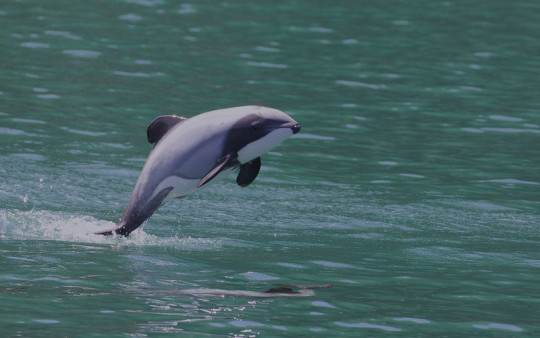
A Hector's dolphin (Cephalorhynchus hectori) leaps from the water in Marlborough, Aotearoa
by Gregory "Slobirdr" Smith
#hector's dolphin#dolphins#cetaceans#cephalorhynchus hectori#cephalorhynchus#delphinidae#cetacea#artiodactyla#mammalia#chordata#wildlife: aotearoa#wildlife: oceania
214 notes
·
View notes
Text

I loved drawing this one. As someone commented on a dolphin I posted from the same family: Is like the pandas of the water. Again, what fascinates me the most about doing this animal encyclopedia is that I get to know mammals I didn't know existed and I can share that information with you all. Thank you for following and being interested. Let's see what can we learn from this wonderful dolphin.
Hector's Dolphin Hector's Dolphin lives exclusively on the coasts of New Zealand. They can live up to 22 years and are some of the smallest dolphins in the world. (If I'm not wrong the Vaquita is the smallest). Because of its size, predators can be numerous. Blue sharks, White sharks, Broadnose sevengill sharks, and probably Killer whales and Mako sharks. They hunt using echolocation which is basically finding prey using sound (Just as bats do). Their clicks (the sound they make) isn't as complex as other animals and travel short distances. Nonetheless is enough for them, since their environment is crowded and sound wouldn't be able to go long distances anyways. This animal is not in danger but its subspecies, the Māui Dolphin is probably one of the most endangered dolphins in the world, if not the most. We will talk about him in our next post. _____________________________________________ Credits: Hector's Dolphin Hector's Dolphin Ballenas, Delfines y Marsopas, Manuales de Identificación / Mark Carwardine, Martin Camm _____________________________________________ Thank you guys for your support! If you like the content, a follow, a like, and/or a reblogged will be very much appreciated. Just wish your dreams come true. Please wish me the same. Thank you!! Don't forget to check out my Store and follow me on Instagram
#Hector's dolphin#dolphins#delfin#animal of the day#marine mammals#illustration art#drawing animals#illo#conservatioin#extinction#wild life#inforgraphics#described in alt text#illustration scientifique#science side of tumblr#scientific illustration#sea mammals#cute animals
66 notes
·
View notes
Text

Postcard. Hectors dolphins, one of the rarest and most endangered species of dolphin.
0 notes
Text

[ID: An image of the Maui‘s dolphin from Crossy Road. End ID.]
Maui’s dolphin from Crossy Road (2014)
5 notes
·
View notes
